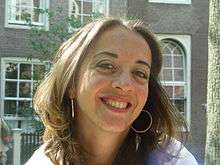Ebru Umar
Ebru Umar (Dutch pronunciation: [ˌe:bru ˈumɑr]; Turkish pronunciation: [ebɾuː umˈaɾ]; born 20 May 1970) is a Dutch columnist of Turkish descent. Under the influence of Theo van Gogh, she gave up a career in management and became a columnist, first for van Gogh's website and, after he was assassinated, as his successor as a regular columnist of Metro.[1] She writes for a number of Dutch magazines and has published four books, often on the topics of feminism and criticism of Islam.
Ebru Umar | |
|---|---|
 | |
| Born | 20 May 1970 The Hague, Netherlands |
| Nationality | Dutch and Turkish |
Biography
Umar is the child of Turkish parents who came to the Netherlands in 1970. Her father is a retired anatomic pathologist, her mother an ophthalmologist.[2] She grew up in Rotterdam and attended the Gymnasium Erasmianum.[3]
After studying management and working for a while as a manager, she began writing, under the influence of Theo van Gogh,[2] and wrote columns for his website (van Gogh was her "friend and mentor"),[4][5] and soon began writing for a number of other Dutch newspapers. In 2005 she took over van Gogh's column in Metro.[6] Umar is also the author of four books, and writes a weekly column for the Dutch women's weekly magazine Libelle[3] (in addition to doing interviews[7] and panel discussions[8] for the magazine) and for the Dutch feminist magazine Opzij.[9] Umar, an atheist, has a reputation for outspokenness, a characteristic her parents say she has had from an early age.[2]
In 2006 she was beaten outside her apartment in Amsterdam by two attackers.[10]
Arrest in Turkey
On April 23, 2016, Umar was arrested in her holiday apartment in the Turkish town of Kuşadası, which she has said was for posting tweets that were critical of Turkish president Erdoğan.[11][12][13] She was then released but not allowed to leave Turkey.[14] On April 24, 2016, her home in Amsterdam was burglarized and vandalized.
Bibliography
- Burka & Blahniks (2004)[15]
- Vier over 8 (2005)
- Geen talent voor de liefde (2005), diary-style reminiscences[16]
- Turkse verleidingen (2008), a collection of travel stories set in Turkey[9]
References
- "Ebru Umar: VVD walgelijke huichelachtige partij, Verdonk wist in 2004 van echte naam Hirsi Ali". Nederlands Juridisch Dagblad (in Dutch). 18 May 2006. Retrieved 30 August 2012.
- Maas, Cornald (9 February 2008). "'Het heeft geen zin tegen Ebru te zeggen dat ze haar mond moet houden'". de Volkskrant (in Dutch). Retrieved 31 August 2012.
- Brandt Corstius, Aaf (8 October 2009). "Een soort Fame-meets-Krachtwijk". NRC Handelsblad (in Dutch). Retrieved 31 August 2012.
- Scroggins, Deborah (2012). Wanted women: faith, lies, and the war on terror : the lives of Ayaan Hirsi Ali and Aafia Siddiqui. New York: Harper. p. 285. ISBN 9780062097958.
- Jong, Perro de (3 November 2004). "Dutch fear loss of tolerance". BBC News. Retrieved 31 August 2012.
- "Ebru Umar opvolger Theo van Gogh". Algemeen Dagblad (in Dutch). 13 October 2005.
- Tassier, Manu (19 May 2009). "'EUROPA mag geen moeial zijn'". De Standaard (in Dutch). Retrieved 31 August 2012.
- Boevink, Wim (2 March 2002). "Even op de gang staan". Trouw (in Dutch). Retrieved 31 August 2012.
- "'Ik blijf!': Turkse schrijfsters roeren zich". Zuid-Kennemerland Dichtbij (in Dutch). 23 March 2012. Retrieved 31 August 2012.
- Reijn, Gerard (25 April 2006). "'Twee kerels die een vrouw slaan, wat een moed'". de Volkskrant (in Dutch). Retrieved 31 August 2012.
- "Columniste Ebru Umar opgepakt in Turkije" (in Dutch). nos.nl.
- "Dutch journalist arrested in Turkey for criticising Erdoğan". The Guardian. Agence France-Presse. 24 April 2016. Retrieved 24 April 2016.
- "Dutch journalist Ebru Umar arrested in Turkey". The Independent. 24 April 2016. Retrieved 24 April 2016.
- "Dutch journalist Ebru Umar 'free but forbidden to leave' Turkey after criticising Erdogan". AFP/Reuters. ABC. 25 April 2016. Retrieved 25 April 2016.
- Moors, Annelies (2012). "The Affective Power of the Face Veil: Between Disgust and Fascination". Things: religions and the question of materiality (in Dutch). New York: Fordham UP. p. 291. ISBN 9780823239450.
- Brink, Jan Auke (28 February 2006). "Rev. of Ebru Umar, Geen talent voor de liefde". 8Weekly (in Dutch). Retrieved 31 August 2012.
External links

- Ebru Umar on Libelle